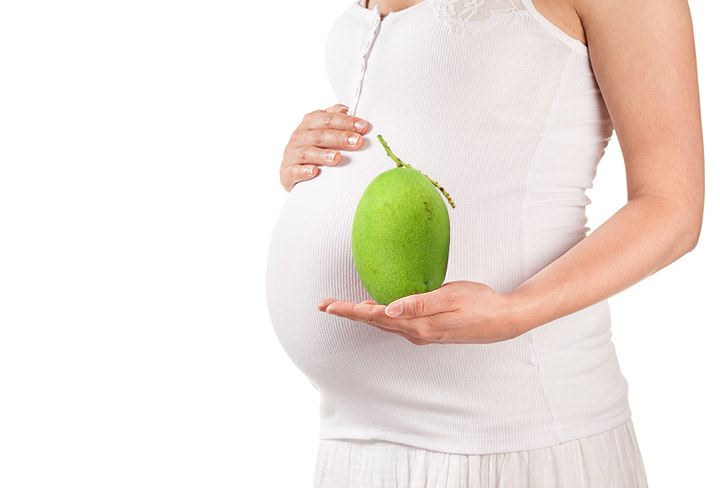Is It Safe To Eat Mango During Pregnancy?
So the good news is you are pregnant! With so much about to happen in the next few months, there will be a host of things you will need to take care of for the health of your unborn baby and you.



As you begin your pregnancy journey, there will be times when people will advise you about various dos and don’ts. One such advice that many ladies often hear is to stay away from consuming mango during pregnancy.
Can Pregnant Women Eat Mango?
Pregnancy is often characterized by craving for specific foods. If you are pregnant during the summer months, a difficult to ignore temptation may be eating mangoes. But do you really need to avoid eating mangoes, or is it safe to consume? Let’s have a look.
Pregnancy is a delicate matter. Consult Trusted doctors at Lybrate.
Let’s begin by understanding the various nutrients that mango-king of fruits has to offer:
Decoding The Nutritional Value:
Per 100 grams, *% of daily value
Nutrients In Mango:
Vitamins And Minerals In Mangoes- How Are They Helpful During Pregnancy?
Mangoes are a rich source of many important minerals and vitamins. Here is a look at how they are good for you, especially during pregnancy.
1. Vitamin A:
Mangoes are a great source of Vitamin A.
2. Fiber:
The fiber content in mangoes helps you feel full for a longer duration.
3. Vitamin C:
Vitamin C is a very powerful antioxidant.
4. Potassium:
It helps control heart rate and blood pressure.
5. Vitamin B6:
Vitamin B6 plays a role in cognitive development and maintains normal nerve function.
6. Copper:
Copper is an important nutrient needed for blood cell formation.
7. Folate:
Folate plays a major role during pregnancy and your doctor has probably put you on a folate supplement already.
Is Consumption Of Mango Safe During Pregnancy?
There are various myths that you may hear about eating mango during pregnancy. However, the nutritional benefits that the fruit contains are enough reason why you should safely go ahead and consume it. As a precaution, we would like to remind you that, since pregnancy is very delicate phase, you should consult your doctor first before eating anything, including mangoes.
Pregnancy is a delicate matter. Consult Trusted doctors at Lybrate.
Here are the reasons why we feel it is safe and important to consume mangoes during pregnancy:
Mangoes In Late Pregnancy:
Last trimester is the crucial stage and you need to savor the fruit with caution. Limit the intake of mango fruit as it can lead to gestational diabetes. Also, if there is a history of mango aversion in the family, you need to be very careful about its consumption. Pay heed to your body and then consume the fruit. If you feel any form of irritation or hives, it is better not to include mango.
Unripe Mangoes In Late Pregnancy:
From olden days, it is advisable not to take unripe mangoes in the last trimester of pregnancy. You need to be away from aam panna and achaar as they can cause bleeding since it is a warm fruit. It can thus lead to miscarriage.
Ripe Or Unripe Mangoes During Pregnancy:
Both ripe and unripe mangoes are safe to consume during pregnancy. The ripe fruits contain natural sugars that can be a great alternative to high-calorie desserts. The ripe mangoes stimulate appetite, aid digestion and improve complexion.
The unripe mangoes contain a good amount of vitamins. These fruits treat morning sickness, cure constipation and fight acidity.
If you like having mango in the form of shake, smoothie, lassi or any dessert, then make sure to check for the added sugars. Also dried mangoes, chutneys, murabba and mango candies have added sweeteners. You need to have them occasionally.
How To Buy Mangoes?
You need to be careful when you choose mangoes in the market. Make sure you do not buy the ones ripened with chemicals. Buy them only in their season as there will be fewer chances of buying the artificially ripened ones.
The most common ripening agent is calcium carbide, which is now a prohibited chemical by the Food Safety and Standards Regulations and the Indian Food and Safety Standards Act. The chemical contains traces of phosphorus and arsenic that are toxic for both the mother and growing baby. The side effects of consuming the artificially ripened mangoes include:
Signs to look for artificially ripened mangoes:
There are few signs to look whether the mango ripening is natural or artificial. Artificial fruits:
Ways you can follow to reduce mango’s exposure to toxins:
You may not be sure whether the fruit is naturally or artificially ripened. However, you can follow the below steps so as to remove the toxins.
Wash them: Wash the mangoes soon after you buy them from the market. It helps in getting rid of the residue chemicals and any listeria contamination. It also prevents cross-contamination and keeps the fridge area clean.
Don’t consume the skin: Peel off the skin and then eat the flesh directly.
Wash your hands clean: Wash your hands after cleaning the mangoes and also clean the knives and chopping board with warm water.
It is advisable to buy mangoes that are not ripe so that you can ripen them at home. Also, there will be less chance of the fruit getting contaminated with calcium carbide. Also, you should avoid eating the fruit roadsides as they are not hygienic.
As long as the amount consumed is taken care of, eating mangoes during pregnancy is not a problem at all. Once your doctor has given you the go-ahead, go on and grab a bowl of freshly diced mangoes! Hope this article made you doubt free from can pregnant women eat mango or not.
Share your thoughts on consuming mangoes during pregnancy with us.


Comments
Post a Comment